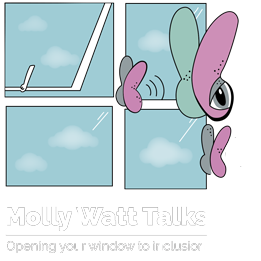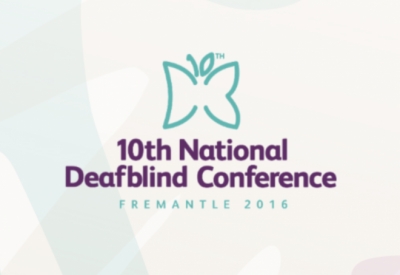I was flattered to be invited to speak at this conference a year ago. A trip to Australia, a presentation and to meet others living with similar challenges to my own, an opportunity not to be missed.
The journey was long and testing, but it was worth it to be a part of such a great event. I was annoyed with myself that I was unwell but my excitement drove me on.
Senses had made every effort to make this conference fully accessible for all in the DeafBlind community- I was extremely impressed.
There was good lighting, there were On Stage interpreters, hand on hand interpreters, finger spelling (HoH) interpreters, STTR (Speech To Text Relay) screens reasonable sized screens, black background and white large text positioned on either side of conference room, and finally a generous amount of staff and volunteers who were there to ensure full inclusion. "Wow" I remember thinking. Australia sure knew how to pull off inclusivity.
It really was something to witness so many modes of communication being used all at one time. It took me quite a while to scan around and see it all.
I could see and fully appreciate just how much difference this show of varying interpretation was making to all attendees.
Bringing deafblind people together is too infrequent in the UK and adds to the isolation many struggle with.
It is something my own small charity is addressing in the UK, but needs to be ongoing.
For me being deaf was never such an issue, I had local deaf and hearing friends I wore hearing aids and with a lot of work and patience I was able to communicate with speech and felt quite 'normal' around family and friends, however the addition of blindness at age 12 really hit home for us all.
One disability was enough, we thought we knew it all... but blindness was a new one and not only did it not stop there, the fear on knowing it's an ongoing progressive blindness.
So many things can happen to an individual having been told they're going blind.
At the conference there were various talks from both professionals and people living with deafblindness of some sort, either themselves, close relatives or friends, there was something for us all to learn from each other.
One of the earlier talks I recall spoke of early influences of Usher syndrome diagnosis.
When blogging or presenting I often speak of my life experiences followed by moving forward, after 10 years being diagnosed I had forgotten some small details.
Some research stated that people of all ages when speaking of their diagnosis, spoke of their parent's reactions as an early and initial memory of their being diagnosed.
After 10 years I realised that many of my early memories of finding out I had Usher was about how I was told, and how the subject was addressed.
2008 when I was sat in the front seat of Mum's car I remember my Mum asking how much I could see... I looked at her as if she was crazy, I can see you!
She proceeded to say 'No, if you look ahead, without moving your head, how much can you see of me?'
I wondered for a split second why she asked though I looked ahead and said casually what I could and couldn't see.. (I could see ahead, however only Mum's hands on the steering wheel to my right).
I remember her response like yesterday. I detected a wobble in her voice and this got me questioning everything. Why? What? Is this not normal?
It was shortly after that when I started being more curious and aware that something wasn't right. I started my own research and asked more questions.
Another presentation I recall was from a medical professional, I tuned in to see if there was anything new I could learn from him, personally, I didn’t!
What I came to realise was Australia's medical research on Usher syndrome in fact seemed quite dated, all the information WA (Western Australia,) were receiving that day I had already learnt back in 2014 at the Usher Coalition conference in Boston, US.
To be frank they even missed a few things, or perhaps forgot to mention a few key points when speaking of the 'basics,' of Usher. This particular professional had also stated he was much more aware of CHARGE a different form of DeafBlindness with additional needs and so seemed extremely more knowledgable on this subject. It's always good to have these medical professionals interested and learning, however, how they present to an audience of deafblind people compared to presenting to his associates is crucial.
I felt a little disappointed he skipped through slides on Usher because he felt they were too 'complex,' to talk about!
Everybody at the presentation was there to learn something, this presentation didn't seem well prepared for the audience but more appropriate to the medical profession. This is something I always consider before presenting to an audience. In other words I WANT everyone in the audience to take something from my presentation, to understand and to learn.
I of course cannot thank Senses enough for their huge commitment to making the event fully accessible.
I was able to benefit hugely from choosing a seat close enough to use my hearing aids and when my eyes weren't too tired the STTR (speech to text relay,) which was presented on big screens in reasonable sized font and on contrasted background. Without these accessibility aids I would not have been able to access very much of this particular presentation.
Sadly the slides were hugely inaccessible with many graphs, white backgrounds and tiny writing - did this medical professional forget he was presenting at a DeafBlind conference?
There were several presentations at the conference that I really wish I could have seen however I was in demand! Ushered away by the press and ABC radio station.
My own presentation took place on the first day, and although I was unwell suffering with inflamed tonsils, a migraine and stiff neck, I thoroughly enjoyed the audience, questions and the general response I received, thank you Australia.
I hope all in the room got something from me.
I was more than happy to do my small part for the community by raising awareness of the conference and of course Usher syndrome /DeafBlindness.
Outside of the conference where I was interviewed I got to check out the many set up stalls.p
It is fair to say I was shocked when my mum said 'Molly that's our kitchen!’ leading me across to the ReSound stall. Not only was the video I made with them last summer playing but it was playing on the other side of the world, I was quite surprised to say the least. "These hearing aids have been a real game changer" I heard me say! Though I cringed it was also a WOW moment.
A very lovely lady, I now know to be Olivia Katarzyna, Sales Director at GN ReSound AUS/NZ popped up from behind the screen and seemed quite excited to see me!
This company have been something of a guiding light to me in the UK since fitting me with their award winning Linx2 hearing aids.
I'm spoken all over the UK and in parts of Europe for GN Hearing they have definitely enabled me to raise awareness of Usher Syndrome.
I had been invited to speak in Denmark at the The GN Leadership conference earlier this year, Olivia's boss Allistair had heard my presentation and was very complimentary of me, I was very flattered. I was so thrilled to hear more, and to meet yet another lovely member of the GN ReSound team.
Another highlight of the conference for me was communicating with as many people as I could. Whilst those who needed it had an interpreter I always make the effort to communicate in whatever mode I could to suit each individual. I learnt that Auslan (Australian Sign language) is very similar to BSL, I was able to recognise SOME sign and so I put my signing skills to the test!
For the many who were Tactile signing, (hoh - hand on hand,) I also recognise how similar this was to BSL hoh, and so I had a go at both and to my surprise I was understood! Sadly with my 5 degrees sight I was truly exhausted after a few conversations but really pleased I made the effort to communicate with everyone, and it was so nice to be appreciated for trying.
Sign language is a great skill but for me with my poor sight it's tiring and the reason I'm thankful of my hearing aids and speech as my main source of communication.
What did I learn from the conference?
I was again reminded just how unique we all are, how no two deafblind people are the same. The one thing we all want despite our varying needs is to be included, the desire for a more accessible and inclusive life and the need for more understanding and awareness of each individuals needs.
I was truly proud to be a small part of such a welcoming community on the other side of the world.
I will definitely cherish the new friends I’ve made and the time spent with them all.
At the end of the day are all in it together wherever we live.
I left Perth having been asked over and over if I'd be in Queensland, Australia at the World Deafblind Conference in 2019, my answer, of course, I'd love to and I'd love to speak again, but who knows?
Next stop Sydney coming soon.



